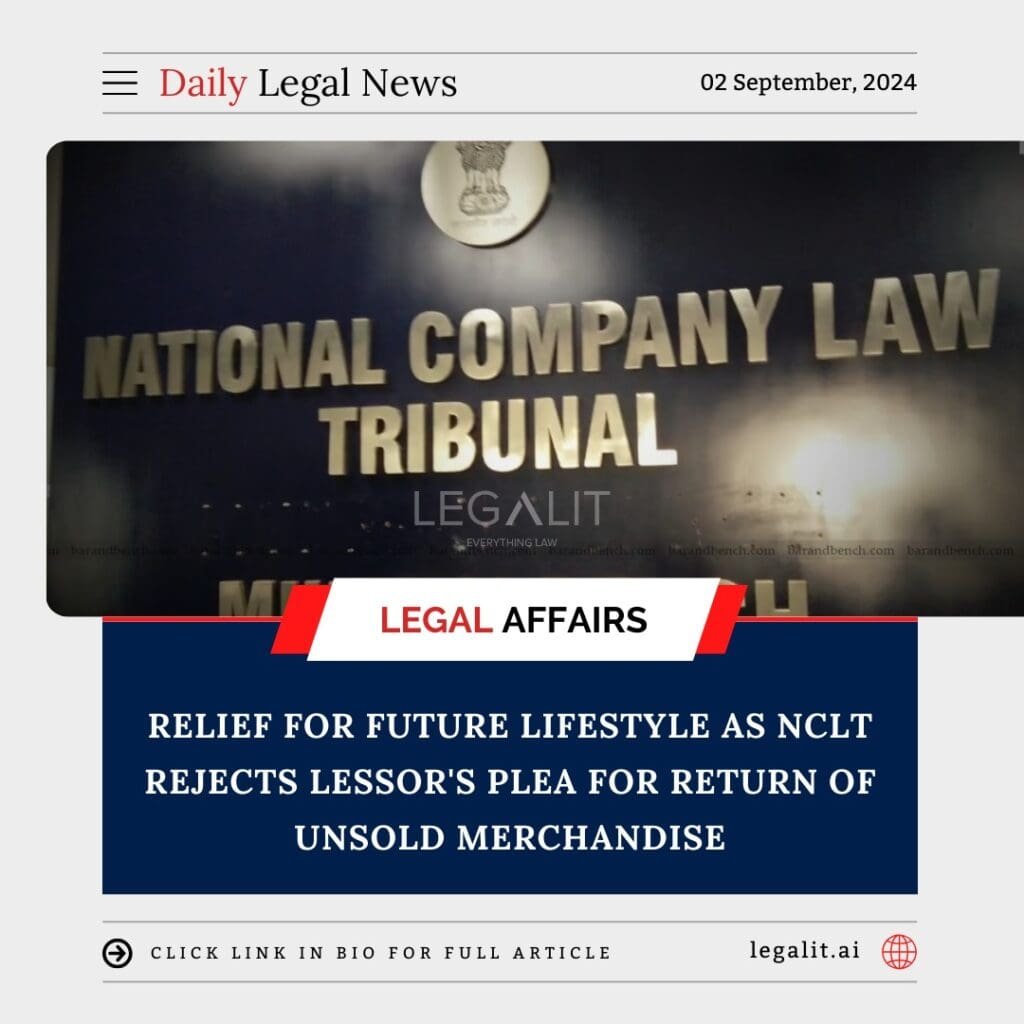
The National Company Law Tribunal (NCLT) has provided significant relief to Future Lifestyle Fashions Ltd (FLFL) by denying a lessor’s plea for the return of unsold merchandise. The decision marks a critical win for the debt-laden company, which has been grappling with insolvency proceedings amid claims from various creditors and operational stakeholders.
Background of the Case:
Future Lifestyle Fashions Ltd, part of the Future Group, is currently undergoing insolvency resolution after being unable to meet its financial obligations. As a major player in India’s retail fashion sector, FLFL has been caught in a debt trap following the collapse of its parent company, Future Retail, and the impact of the pandemic on its business operations. Several lessors, suppliers, and creditors have been seeking claims in the ongoing insolvency proceedings.
The current case involved a plea by one of FLFL’s lessors, who requested the NCLT to direct the company to return unsold merchandise from a leased retail space. The lessor argued that the unsold goods were their property and that they should be returned to mitigate potential losses resulting from the termination of the lease due to insolvency.
Key Points from the NCLT Ruling:
- Denial of Lessor’s Plea: The NCLT rejected the lessor’s plea to reclaim unsold merchandise from the leased property, stating that once the goods are in possession of the company undergoing insolvency proceedings, they become part of the corporate debtor’s assets. As such, any demand for the return of these goods cannot be entertained outside the framework of the insolvency resolution process.
- Interpretation of Insolvency and Bankruptcy Code (IBC): The tribunal clarified that under the Insolvency and Bankruptcy Code (IBC), all assets of the debtor, including merchandise held at various retail outlets, are considered part of the company’s estate. The resolution professional appointed for FLFL is responsible for managing these assets and determining their use in the resolution process.
- Protection of Creditors’ Interests: The NCLT underscored the importance of adhering to the IBC’s objective of maximizing value for all stakeholders, including secured and unsecured creditors. The tribunal noted that allowing the lessor’s plea would set a problematic precedent, potentially opening the floodgates for similar claims by other creditors or operational stakeholders, which could disrupt the orderly conduct of insolvency proceedings.
- Right to File Claims: The tribunal reminded the lessor and other stakeholders that they have the right to file their claims with the resolution professional overseeing the insolvency process. Any grievances or claims for compensation should be addressed through the structured mechanism provided under the IBC, rather than seeking separate relief outside the insolvency process.
- Impact on Future Lifestyle’s Resolution Process: By rejecting the lessor’s plea, the NCLT has effectively protected FLFL from a potential fragmentation of its assets, which could have complicated the resolution process. The decision allows the company to retain control over its inventory and merchandise, which could be crucial for its restructuring efforts or for generating value to repay creditors.
Broader Implications of the Ruling:
The NCLT’s decision is significant as it reinforces the legal framework established under the Insolvency and Bankruptcy Code, which aims to consolidate and resolve claims in a fair and orderly manner. This ruling serves as a precedent that emphasizes the importance of adhering to the established procedures under the IBC, rather than seeking individual relief that could undermine the collective resolution process.
For Future Lifestyle Fashions Ltd, this ruling provides a temporary reprieve and enables the company to focus on its broader resolution strategy. It underscores the NCLT’s commitment to protecting the assets of companies under insolvency from piecemeal claims, ensuring that the resolution process proceeds smoothly without undue interference.
The decision is also likely to be watched closely by other businesses and stakeholders involved in insolvency proceedings, as it reaffirms the tribunal’s stance on protecting the integrity and objectives of the IBC framework, which prioritizes the collective interests of all creditors over individual claims.